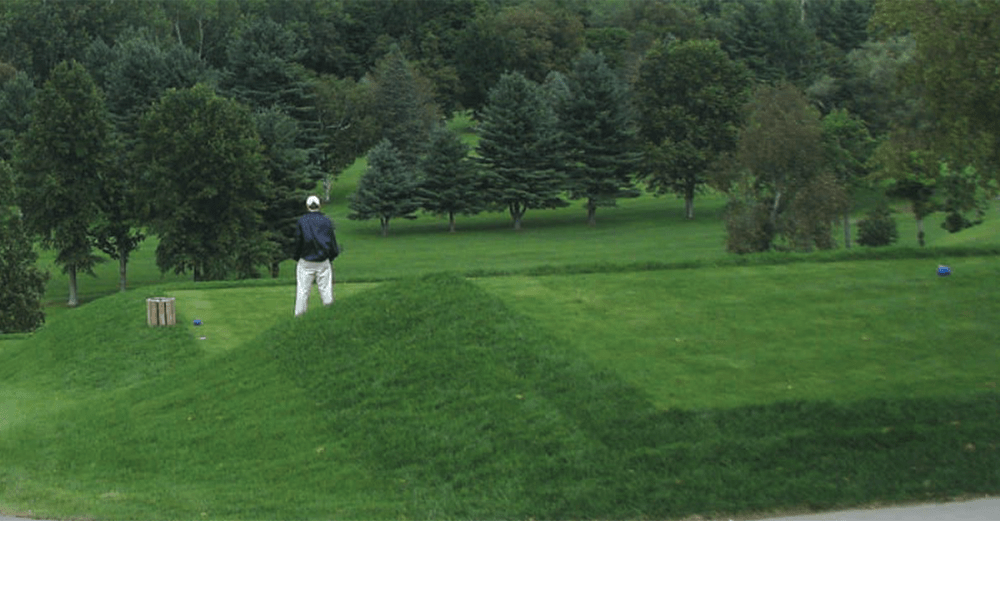A Diamond in the Rough


A finished tee complex. Tees are are probably the easiest feature your can recreate and improve the playing experience.
Somewhere on the links at a small country club in Bennington, Vermont, a diamond engagement ring was lost a few years ago and never found. When I first heard the story as a newly appointed golf course superintendent, I made the first agronomic assessment of my tenure: that unless the ring fell on low cut turf, it never stood a chance of being found.
What a great way to start a new job. No concerns over the staff you are about to inherit, no worries about tight budgets and agronomic challenges, no issues with a stuffy greens committee or a demanding membership. The only thing on my mind that day was where do I purchase a metal detector in Vermont, because she’s getting ancy, and the reality is I cut grass for a living.
Humor aside, let me be the first to agree that as golf course superintendents, we do a lot more than just cut grass, and our salaries can be quite healthy as well.
Our responsibilities often exceed the boundaries of the maintenance operation, and we always have to wear a lot of hats.
Another statement of the obvious I have generated after my second golf course renovation is that if you truly put in an honest effort, it doesn’t matter what club, what climate, what height you cut your greens at, or how strong your budget is, each and every one of us feels the same at the end of the day, tired.
Yet a backbone seemed present, the history, the spectacular views of the mountains, and a challenging topography on the golf course upon which local golfers have branded the nickname “Mt. Agony.”
The property truly has character, and all it needs is some professional attention from both a construction and an agronomic standpoint.
Good Jobs Are Where You Find Them
With all this behind, my movements nowadays fall strongly on what is most important to me as a person, and not just a golf course superintendent.
For me, quality of life is important, and success is not measured solely by a dollar figure.
Financial stability is no doubt crucial, but it must be balanced with a smile at the beginning and end of each day.
A challenging project in Vermont was attractive in this way, so I packed my bags and went north.
A lot of my colleagues in the Metropolitan area of New York thought I was crazy to leave a stable situation at a private club, and hike north to an area with far less energy. What was hard to explain was that we were not leaving the energy behind, we were taking it with us, and using it to not only upgrade a country club but to strengthen a local economy and fulfill the developer’s vision to someday see his native mill town, host, one of the premier golfing destinations in Vermont.
I was of course motivated to relocate for other reasons. I had made many sacrifices early in my career to provide myself with the option to go in any direction I wanted to. In my opinion, like any other profession, it is necessary early on to do things the old-fashioned way. You have to suck it up, work as hard as you can, and build a strong lineage. You do this by working for the right people at the right places.
One of the most annoying things to me in this industry, are some of these students who graduate from turf school thinking they can walk straight into a management position. Here’s my message and I think many of you will agree: “Congratulations on finishing college, now see that shovel over there? Grab it, start digging, and come back in 5 years.” I believe that as technical as this industry has become, it still comes down to the virtues of gold old-fashioned hard work.
Prioritizing a Golf Course Renovation
One of the biggest challenges, when you take on a golf course renovation, is how to prioritize your projects. You have to move through a golf course in a logical way, but as we all know the dynamics of any golf operation can make this seem impossible. If you as a golf course superintendent are asked to take the lead on a project, my recommendation is to first put the money towards your putting surfaces.
When you don’t have a 3 million dollar maintenance budget, I believe firmly that you have to throw everything you have at the greens, until they are perfect, even if it means letting some other things go. Golfers respect quality putting surfaces, and if you can maintain that, you will receive the fewest number of complaints during any disruptive phases of construction. Tip the scales towards your greens.
When the snow melted off my first spring, I walked out to my fifth putting green which is located near my shop. I got on top of it and observed exactly what I expected; thatchy turf that looked like it was cut at fairway height. What a dump. What did I get myself into! The positive aspect was that there was grass everywhere, tee to green.
It wasn’t beat up with snow mold or winter kill, it was healthy and boasted a surprising number of plants. So I purchased an aerator, a set of verticutters, and about ten million tons of topdressing.
Within three months, on a scale of 1 to 10 the putting surfaces went from a 2 to an 8.
Within ten months I like to think of it as an agronomic embassy because when you now stand on a green you’re no longer in an old mill town in Vermont, you’re on top of any putting surface in Westchester County New York.
I came to this revolutionary concept after leaving the fast-paced lifestyle of metropolitan New York to head north where traffic lights are minimal, the demands of the average golfer are less intense, and the grass just seems to be a lot greener.
This all sounds wonderful, but the reality I found is that if you really care, the job is always the same no matter where you go. The only thing we can control is where we choose to live and who we choose to work for.
In October 2007, a developer out of Westchester County New York purchased Mt Anthony Country Club, founded in 1897 and located in Bennington Vermont. As both a business college and close friend, I was invited up on a chilly fall afternoon to take a look.
Ironically, my first impression of the property was a diamond in the rough, a golf club rich in history that once flourished as the stately elitist venue had apparently seen one too many Vermont winters, and had weathered away to a public facility that was mediocre at best.
Yet in a situation like this, you can’t help but ask yourself whether or not you are wasting your time and just polishing a turd. For me, our CAT D-5 sitting in the parking lot, full of diesel, always seems to curb any discouraging thoughts. Second, to verticutters, a dozer is a great tool for improving a golf course that is in shambles.
With any renovation, there is always an ideal way to move through a golf course, but usually, you have to be realistic about time and money. In my situation, I am not dealing with a greens committee that wants to steer in every direction.
Our greens committee consists of the individual owner/developer and myself. We work one on one and communicate on a daily basis.
This not only makes things easy, but I have also realized how well things can go when the right people are making the decisions. Our two-man greens committee consists of a seasoned golf course superintendent and a 30 year veteran of the industry who renovates golf courses for a living
As you can imagine, we don’t waste a penny. The money spent is well spent, and everything we do is good for 20 years.
Yet another great reason to be here, no bureaucracy, no unnecessary pressure, and aiming to please a membership that could throw you out the door as fast as you were hired.
I never found the diamond ring that was lost out on the golf course, but I never actually tried to find it.
I did manage to put a ring on her finger and find a great job, in a place where you might least expect to find one.
So my message is to stay motivated with your career but always remain focused on living your life, at least to some extent.
Golf exists almost everywhere you go, and if you play your cards right, you can use this to your advantage and find your own little niche in the industry.
Recent Posts
Memphis Country Club: A Golfer’s Study in Precision and Tradition
If you have ever teed it up at Memphis Country Club, you know this isn’t…
Foley Company attains GCSAA Silver Partner Status
Foley Company, a leader in turf equipment innovation and technology, affirms its support of the…
Harrell’s continues longstanding support of the GCSAA Foundation
Harrell’s LLC, a leading distributor of customized agronomic products for turfgrass since 1941, has donated…
City of Orlando Announces New State-of-the-Art Driving Range at Dubsdread Golf Course
The City of Orlando is excited to announce the construction of a brand-new, state-of-the-art driving…
Discover Puerto Rico for Great Golf Trips and After-Round Activities, Amenities
Golfers cannot live by the game alone which is why Puerto Rico provides the perfect…
Q&A with a Multi-talented Golf Course Architect – Part 2: Making the Rounds – Installment 39
This column features recollections of the author’s 37 years as a golf writer. These installments…


